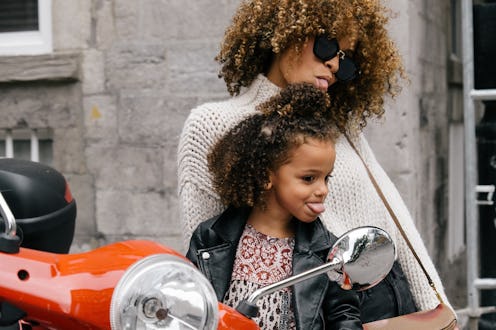
Raising tiny humans is pretty tough stuff no matter who you are, and there's certainly no one right way to do it. But as a woman who has chosen to have children and also a woman who identifies as a feminist, I've found that feminism helps me be a better parent. It's not just in the big, sweeping ways you might imagine either — sure, I think my kids benefit from having a mom who campaigns for gender equality. However, it also has a lot to do with the myriad little ways my feminism surfaces in my parenting style.
Of course, there are those who believe you can't be a card-carrying feminist and have children, too — that the two are in direct opposition because having children might unwittingly force a woman to adhere to traditional gender roles or expectations. But while I can't speak for every mother, I can tell you that my experience has been quite the opposite. Obviously it's a totally legitimate choice not to have children — either decision can be a feminist choice, and either decision can be made by feminist people. For me personally, though, the truth is that having children has, in many ways, bolstered my feminism. I have a 5-year-old daughter who will one day grow up to become a feminist in her own right. And I have a son who will, too — I want for him early on to embrace the belief that men and women should have equal rights and opportunities, and that his sister should be afforded the same advantages that he will enjoy because of his gender. I want these things, and more, for both my children, and for every other person out there, too.
So yes, I am a feminist and I am a mom. Here are a few little ways the first makes me better at being the second.
1. I Let My Kids Dress Themselves
Am I sometimes tempted to put my kids in color-coordinated outfits I've personally curated before we go out in public? Sure. But I also know that it's oh-so-important for my children to understand their own agency. They have a right to make decisions regarding their bodies and, in this case, what goes on it. If that means my son wants to wear a pink tutu with his Star Wars shirt at a time when he is not going either to the ballet or to the Death Star, so be it. I don't mind the sideways stares from strangers, especially if it helps my children will grow up with a solid grasp of the fact it isn't OK for other people to inform their decisions about their bodies.
2. I Refer To Anatomical Parts By Their Names
A vagina is not like Lord Voldemort. It won't spring to life and start sucking unicorn blood if you speak its name. The more euphemisms I use for genitals now, the more my kids will just have to unlearn later in life. They are body parts, plain and simple, and I think that by saying both "penis" and "vagina" — as opposed to saying "penis" outright, but coming up with a cutesy nickname for "vagina," per the norm — without stigma reinforces the fact that women and men are equals. Plus, I hope and believe it circumvents any shame around said body parts.
3. I Tend To Go Off On Tangents
You may be thinking, How does this woman raving have anything to do with being a better parent? Well, here's how. When I'm gushing about the brilliance of the Notorious RBG coloring book or weighing in on Barbie's new looks, my kids get to see a woman who is passionate and engaged and has thoughts she wants to express and she does. Is it that far-fetched to believe this example will ultimately lead to my kids growing into adults who are also passionate and engaged and expressive? Particularly my daughter, who will see her mother as a woman who would not be silenced by societal norms in any way, shape, or form.
4. I Take Out The Trash
And my husband does the dishes. See where I'm going with this? We don't believe in gendered chores in this household. My kids are still a bit young for many of the more classic gendered tasks (think mowing the lawn for boys, mopping for girls), but they'll undoubtedly have interchangeable chore charts that grow right along with them. Everyone is responsible for their own mess regardless of gender, which is a lesson that should serve them well when they are adults, too.